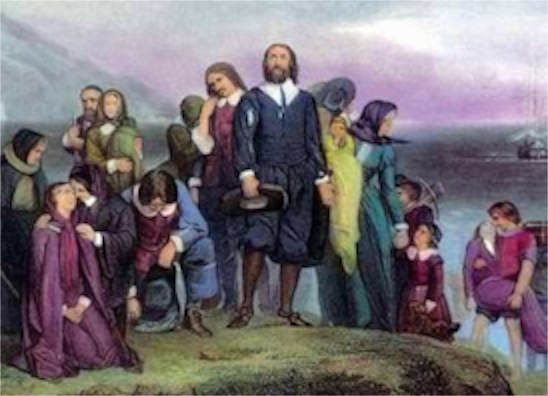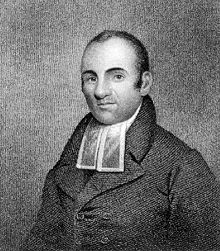Changing Times
18/06/12 05:32
A number of years ago, while working on a project that produced a resource for confirmation preparation, I did a brief comparison of the charts that American Christian denominations used to illustrate church history. It was interesting how each denomination seemed to see itself as the natural culmination of all of church history. Major divisions in the church were charted as branches in a stream. Almost all of the diagrams used either trees or streams as an illustration and showed how history had progressed in such a way to make the particular denomination the natural outcome of the history of the church.
The real story is much different. The history of the Christian Church and of denominations, especially in the United States is filled with bitter divides and divisions over theology, polity and a host of other issues.
The great splits in the history of Christianity have resulted in major differences in various parts of the church. The Great Schism produced orthodox and catholic churches. The Protestant Reformation divided the church again.
 Our particular branch of Christianity has its roots in the split that divided the Church of England from the Roman Catholic Church. Not long after that division, Puritans in England sought further reforms in the church. They attempted a return to New Testament Christianity. The New Testament doesn’t provide much information about how churches should be organized or what specific policies should govern the lives of church members, so there were disagreements. One of the disagreements was over the issue of the appropriate age for baptism. Some cited the adult baptism of Jesus as the sole model. Others cited the baptism of entire families in Acts as evidence that child and infant baptism should be practiced. At the opening of the 17th Century, John Smyth was a leading advocate of adult baptism in England. In 1609 he re-baptized himself and others. He raised eyebrows because of the fact that he conducted his own baptism and because of his promotion of the re-baptism of himself and others, thus questioning the authenticity of baptisms already conducted in other churches.
Our particular branch of Christianity has its roots in the split that divided the Church of England from the Roman Catholic Church. Not long after that division, Puritans in England sought further reforms in the church. They attempted a return to New Testament Christianity. The New Testament doesn’t provide much information about how churches should be organized or what specific policies should govern the lives of church members, so there were disagreements. One of the disagreements was over the issue of the appropriate age for baptism. Some cited the adult baptism of Jesus as the sole model. Others cited the baptism of entire families in Acts as evidence that child and infant baptism should be practiced. At the opening of the 17th Century, John Smyth was a leading advocate of adult baptism in England. In 1609 he re-baptized himself and others. He raised eyebrows because of the fact that he conducted his own baptism and because of his promotion of the re-baptism of himself and others, thus questioning the authenticity of baptisms already conducted in other churches.
The Baptists, as his followers were soon called, were persecuted in England. Like the Pilgrims who founded our denomination in America, they left England and, under the leadership of Roger Williams, the first Baptist church in America was established at Providence, Rhode Island in 1638 after Williams was essentially driven out of the Massachusetts Bay Colony. The Baptists and Congregationalists had similar organizational structures derived from their shared history.
Emotional conversion, adult baptism, membership in a community and accountability to the communion became the hallmarks of American Baptists. The concept of separation of church and state as a principal of American Government was the result of the division. While the Congregationalists envisioned an America where their version of Christianity was dominant, supported and promoted by the government, the Baptists insisted on sufficient religious freedom for them to practice their version of the faith.
The Baptists and Congregationalists both grew and expanded through the 1700’s and early 1800’s, forming missionary societies, opening new congregations, and expanding ministries across the United States. The Congregationalists tended to be more dominant in the New England states while the Baptists grew more quickly in the south. By the 1830’s a major division was occurring within the Baptist Convention. Northern Baptists began to push for an end to slavery, while Southern Baptists maintained the Bible condoned the Slavery. The division became official in 1845 when the Baptist Home Mission Society declared that a person could not be a missionary and wish to keep slaves as property. This was intolerable to those in the south and they formed the Southern Baptist Convention as a separate church.
 The Southern Baptist Convention has tended to be more conservative and slower to change than the American Baptist Convention in the North. But change has occurred nonetheless. The Annual Meeting of the Southern Baptist Convention will open tomorrow in New Orleans, Louisiana. One of the votes that will occur is the election of a new president for the convention. Rev. Fred Luther is running unopposed and is expected to easily win the election. Rev. Fred Luther is an African-American. The Southern Baptist Convention is no longer pro-slavery. They no longer embrace the separation of races. Change comes to the whole church, even its most conservative communions.
The Southern Baptist Convention has tended to be more conservative and slower to change than the American Baptist Convention in the North. But change has occurred nonetheless. The Annual Meeting of the Southern Baptist Convention will open tomorrow in New Orleans, Louisiana. One of the votes that will occur is the election of a new president for the convention. Rev. Fred Luther is running unopposed and is expected to easily win the election. Rev. Fred Luther is an African-American. The Southern Baptist Convention is no longer pro-slavery. They no longer embrace the separation of races. Change comes to the whole church, even its most conservative communions.
Rev. Luther was a street preacher when the Southern Baptists were looking for someone to lead a struggling congregation in a transitional neighborhood in New Orleans. As African-Americans moved into the neighborhood, whites were leaving. The once-thriving Southern Baptist Church was empty and the building was offered by the Convention as a place to build up a new congregation, as long as that congregation remained affiliated with the Southern Baptist Convention. Rev. Luther and 50 people took on that challenge and they built the congregation to the thriving 5,000-member church that it is today. The church and neighborhood were devastated by the floods that followed Hurricane Katrina, but they rebuilt, replacing all of the furniture and expanding the church. Now their pastor is in line to be elected president of the Southern Baptist Convention.
The Southern Baptist Convention continues to enjoy calling itself conservative. They continue to look to the Bible as a guide to social issues. They continue to interpret it in ways that are distinct from other Christians. But it is fascinating to see how old issues have fallen away. In today’s culture of hot button issues, it is good to remember that the fight over slavery was bitter and divisive and that people on both sides of the debate claimed exclusive ownership of the Christian moral high ground. They cited their bibles and declared that their opponents were not worthy to be called Christian. By comparison with the debate over slavery, the current debate over the role of gay and lesbian pastors in the church is mild. It likely will not happen in our lifetime, but it seems quite likely that a day will come when the church is of one mind on that issue as well.
 I’m not a Baptist. I’m not a Southern Baptist. My people followed different paths in those divisions of the church. But I celebrate with the Southern Baptist the election of their first African-American president. As a member of the denomination where the first African-American minister was ordained in 1785, and whose current African-American General Minister and President is not our first, I celebrate with the Southern Baptists this week in the election of their new President.
I’m not a Baptist. I’m not a Southern Baptist. My people followed different paths in those divisions of the church. But I celebrate with the Southern Baptist the election of their first African-American president. As a member of the denomination where the first African-American minister was ordained in 1785, and whose current African-American General Minister and President is not our first, I celebrate with the Southern Baptists this week in the election of their new President.
There is more to bind us together in our faith than there is to divide us.
The real story is much different. The history of the Christian Church and of denominations, especially in the United States is filled with bitter divides and divisions over theology, polity and a host of other issues.
The great splits in the history of Christianity have resulted in major differences in various parts of the church. The Great Schism produced orthodox and catholic churches. The Protestant Reformation divided the church again.

The Baptists, as his followers were soon called, were persecuted in England. Like the Pilgrims who founded our denomination in America, they left England and, under the leadership of Roger Williams, the first Baptist church in America was established at Providence, Rhode Island in 1638 after Williams was essentially driven out of the Massachusetts Bay Colony. The Baptists and Congregationalists had similar organizational structures derived from their shared history.
Emotional conversion, adult baptism, membership in a community and accountability to the communion became the hallmarks of American Baptists. The concept of separation of church and state as a principal of American Government was the result of the division. While the Congregationalists envisioned an America where their version of Christianity was dominant, supported and promoted by the government, the Baptists insisted on sufficient religious freedom for them to practice their version of the faith.
The Baptists and Congregationalists both grew and expanded through the 1700’s and early 1800’s, forming missionary societies, opening new congregations, and expanding ministries across the United States. The Congregationalists tended to be more dominant in the New England states while the Baptists grew more quickly in the south. By the 1830’s a major division was occurring within the Baptist Convention. Northern Baptists began to push for an end to slavery, while Southern Baptists maintained the Bible condoned the Slavery. The division became official in 1845 when the Baptist Home Mission Society declared that a person could not be a missionary and wish to keep slaves as property. This was intolerable to those in the south and they formed the Southern Baptist Convention as a separate church.

Rev. Luther was a street preacher when the Southern Baptists were looking for someone to lead a struggling congregation in a transitional neighborhood in New Orleans. As African-Americans moved into the neighborhood, whites were leaving. The once-thriving Southern Baptist Church was empty and the building was offered by the Convention as a place to build up a new congregation, as long as that congregation remained affiliated with the Southern Baptist Convention. Rev. Luther and 50 people took on that challenge and they built the congregation to the thriving 5,000-member church that it is today. The church and neighborhood were devastated by the floods that followed Hurricane Katrina, but they rebuilt, replacing all of the furniture and expanding the church. Now their pastor is in line to be elected president of the Southern Baptist Convention.
The Southern Baptist Convention continues to enjoy calling itself conservative. They continue to look to the Bible as a guide to social issues. They continue to interpret it in ways that are distinct from other Christians. But it is fascinating to see how old issues have fallen away. In today’s culture of hot button issues, it is good to remember that the fight over slavery was bitter and divisive and that people on both sides of the debate claimed exclusive ownership of the Christian moral high ground. They cited their bibles and declared that their opponents were not worthy to be called Christian. By comparison with the debate over slavery, the current debate over the role of gay and lesbian pastors in the church is mild. It likely will not happen in our lifetime, but it seems quite likely that a day will come when the church is of one mind on that issue as well.

There is more to bind us together in our faith than there is to divide us.